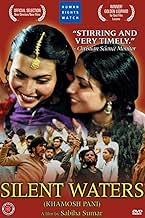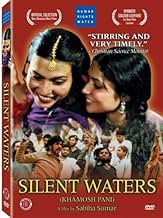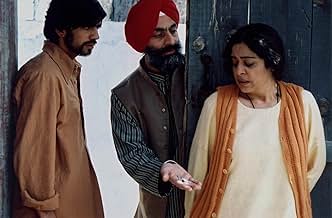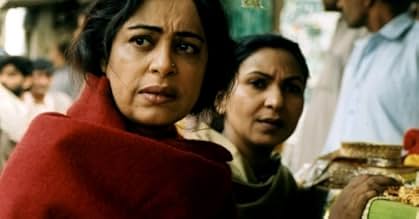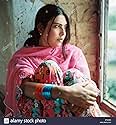VALUTAZIONE IMDb
7,5/10
1298
LA TUA VALUTAZIONE
Aggiungi una trama nella tua lingua1979. A village in Pakistan. A widow sees her 17 years old son being attracted to Islamist militants. It brings her past back.1979. A village in Pakistan. A widow sees her 17 years old son being attracted to Islamist militants. It brings her past back.1979. A village in Pakistan. A widow sees her 17 years old son being attracted to Islamist militants. It brings her past back.
- Regia
- Sceneggiatura
- Star
- Premi
- 8 vittorie e 2 candidature totali
Aamir Ali Malik
- Saleem
- (as Aamir Malik)
Navtej Singh Johar
- Jaswant
- (as Navtej Johar)
Arshad Mahmood
- Mehboob
- (as Arsad Mahmud)
Fareeha Jabeen
- Shabnam
- (as Fariha Jabeen)
Recensioni in evidenza
Khamosh Pani will go down in Pakistani history as the most important work of art and politic since the country's inception. The story documents the era (1979) of the CIA-assisted killing of the democratically elected prime minister Bhutto and the installation of fundamentalist dictator General Zia ul-Haq. The film chronicles the death of love and the birth of hate as part of a continuing cycle of violence that has besieged that part of the world. Religious intolerance, bigotry and ignorance are the fierce villains of the movie. The film has managed to humanize the tragedy of the Pakistani people's struggle with fanaticism and imported agendas. What I particularly love about this film, besides the fact that it is technically remarkable, is the fact that it does not glorify death or killing. This is not a Bollywood or Lollywood melodrama. Beautiful punjabi language script adds to the authenticity of this true-to-life cinema representation of the people of the land. This film is brave to acknowledge the atrocities of displacement; of the violence against Sikhs and against women that was part of the partition of India and Pakistan. Well acted, well written and extremely well directed. Bravo!
There is a side to Pakistan most of us are blind to. At least visually.
Director Sabiha Sumar presents that side to us -- a desolate, barren Pakistan, a magnificent, sprawling wasteland worthy of a Sergio Leone classic. For someone used to the congested streets of an Indian metropolis, seeing this grand, hilly Pakistani village, full of whispered secrets and echoed threats holds a surreal poignancy.
In the Charkhi village of Punjab in Pakistan, life is quirky, quaint, and increasingly foreboding. The setting itself presents a paradox: there are fortresses available for youngsters to romantically rendezvous, but no place for a kafir (non-Muslim) to hide.
Khamosh Pani revolves around the life of a simple, middle-aged woman, Ayesha, played by Kirron Kher. She seems normal enough, a typical Pakistani lady, living the placid life of a widow, supporting her family by giving Quran lessons to neighbourhood children. As the film builds slowly into its plot, we begin to suspect the central protagonist is actually her wistful son, Saleem.
Saleem, played by Aamir Malik, looks exactly in the Jimmy Mistry (The Guru, East Is East) mold, just floppier, lazy, and intensely likable. With a boyish grin firmly in place, he is smitten with girl-next-door, the no-nonsense Zubeida, who's trying to goad him into getting a job.
As the two murmur besotted secrets to each other across the roofs of conveniently empty minarets, Saleem realises that Zubeidaa's dreams of going to college and fashioning her career and her own riches far outweigh his own. In fact, he doesn't have any dream at all, just shuffling through life listlessly. He needs a vocation, a higher cause to believe in.
At this crucial juncture in his youth, Charkhi's naïveté is shattered by the arrival of Islamic fundamentalists. We suddenly realize that the year is 1979, and we're told emotionally that Prime Minister Zulfikar Ali Bhutto has just been hanged.
There is ample scope for over-dramatisation, but the scene has been handled with wonderful restraint -- a postman stands by his bicycle, seemingly lost. When Ayesha repeatedly asks him what's wrong, he just shakes his head and shows her the paper, muttering in disbelief that the prime minister has been hanged. Immediately, we're framed into uncannily familiar perspective:
General Zia's period of marshal law has begun.
As the Sikhs are allowed to cross the border and revisit their native places of worship, dissent and fundamentalism sets in deeper. Saleem is now one of them, a misguided boy strongly hanging on to a deluded version of Allah.
The film turns darker and more sombre as an important issue comes evocatively to the fore. A gentle visiting Sikh alludes to the prospect of some female relatives being left behind during Partition, but is silenced vehemently by those around him. It is an issue of pride, and we are awakened to the nightmare that families actually killed their own, sacrificing them brutally to avoid dishonor at the hands of the enemy.
The irony is painfully simple: the womanfolk were actually safer in the hands of the very enemy, whose attempt at dishonor was probably preferable to the slaughter their own families put them through.
Zubair (Navtej Johar), however, is a Sikh determined to find his long-lost elder sister, and is sure she lived around these parts. The film is based on true incidents of the time, and as we shuttle through flashback and the present, Khamosh Pani confronts us with information many of us are unaware of.
The film is subtle, and refreshingly free of hysteria, enough to make it one of the best films in the increasingly crowded Partition genre, and reminds us that the subject still has so much to explore. It's a film striking in its simplicity, unlike most recent attempts that usually peter off into melodrama or pander to clichés and even propaganda.
Most directors, with an eye on the festival circuit, try to exaggerate their viewpoints, and show off cinematic abilities. Mira Nair is a case in point. Here, the debutante filmmaker has made a commendable first effort, with visible sincerity. Her lead actress, Kher, has done an overwhelming job, underplayed but truly a wonderfully written role.
This is the first Pakistani film I've ever watched; Sabiha Sumar has made sure it won't be the last.
Director Sabiha Sumar presents that side to us -- a desolate, barren Pakistan, a magnificent, sprawling wasteland worthy of a Sergio Leone classic. For someone used to the congested streets of an Indian metropolis, seeing this grand, hilly Pakistani village, full of whispered secrets and echoed threats holds a surreal poignancy.
In the Charkhi village of Punjab in Pakistan, life is quirky, quaint, and increasingly foreboding. The setting itself presents a paradox: there are fortresses available for youngsters to romantically rendezvous, but no place for a kafir (non-Muslim) to hide.
Khamosh Pani revolves around the life of a simple, middle-aged woman, Ayesha, played by Kirron Kher. She seems normal enough, a typical Pakistani lady, living the placid life of a widow, supporting her family by giving Quran lessons to neighbourhood children. As the film builds slowly into its plot, we begin to suspect the central protagonist is actually her wistful son, Saleem.
Saleem, played by Aamir Malik, looks exactly in the Jimmy Mistry (The Guru, East Is East) mold, just floppier, lazy, and intensely likable. With a boyish grin firmly in place, he is smitten with girl-next-door, the no-nonsense Zubeida, who's trying to goad him into getting a job.
As the two murmur besotted secrets to each other across the roofs of conveniently empty minarets, Saleem realises that Zubeidaa's dreams of going to college and fashioning her career and her own riches far outweigh his own. In fact, he doesn't have any dream at all, just shuffling through life listlessly. He needs a vocation, a higher cause to believe in.
At this crucial juncture in his youth, Charkhi's naïveté is shattered by the arrival of Islamic fundamentalists. We suddenly realize that the year is 1979, and we're told emotionally that Prime Minister Zulfikar Ali Bhutto has just been hanged.
There is ample scope for over-dramatisation, but the scene has been handled with wonderful restraint -- a postman stands by his bicycle, seemingly lost. When Ayesha repeatedly asks him what's wrong, he just shakes his head and shows her the paper, muttering in disbelief that the prime minister has been hanged. Immediately, we're framed into uncannily familiar perspective:
General Zia's period of marshal law has begun.
As the Sikhs are allowed to cross the border and revisit their native places of worship, dissent and fundamentalism sets in deeper. Saleem is now one of them, a misguided boy strongly hanging on to a deluded version of Allah.
The film turns darker and more sombre as an important issue comes evocatively to the fore. A gentle visiting Sikh alludes to the prospect of some female relatives being left behind during Partition, but is silenced vehemently by those around him. It is an issue of pride, and we are awakened to the nightmare that families actually killed their own, sacrificing them brutally to avoid dishonor at the hands of the enemy.
The irony is painfully simple: the womanfolk were actually safer in the hands of the very enemy, whose attempt at dishonor was probably preferable to the slaughter their own families put them through.
Zubair (Navtej Johar), however, is a Sikh determined to find his long-lost elder sister, and is sure she lived around these parts. The film is based on true incidents of the time, and as we shuttle through flashback and the present, Khamosh Pani confronts us with information many of us are unaware of.
The film is subtle, and refreshingly free of hysteria, enough to make it one of the best films in the increasingly crowded Partition genre, and reminds us that the subject still has so much to explore. It's a film striking in its simplicity, unlike most recent attempts that usually peter off into melodrama or pander to clichés and even propaganda.
Most directors, with an eye on the festival circuit, try to exaggerate their viewpoints, and show off cinematic abilities. Mira Nair is a case in point. Here, the debutante filmmaker has made a commendable first effort, with visible sincerity. Her lead actress, Kher, has done an overwhelming job, underplayed but truly a wonderfully written role.
This is the first Pakistani film I've ever watched; Sabiha Sumar has made sure it won't be the last.
Nothing prepares you for the subtlety and searing honesty of this film. There is something ennobling about watching it. The director gives us vignettes of life in Pakistan, circa 1980 and 1999, and paints the portrait of a country in the grip of a ruinous Islamization. General Zia-ul-Haq took the country backward by several years through his repressive policies and Sabiha Sumar shows us glimpse of what he did to the country.
In a film so subtly wrought, it is unusual to be struck particularly by acting performances but for Shilpa Shukla is a revelation. It is a splendidly understated performance and I must say her sensuality stirred me too.
In a film so subtly wrought, it is unusual to be struck particularly by acting performances but for Shilpa Shukla is a revelation. It is a splendidly understated performance and I must say her sensuality stirred me too.
'Silent Waters'is consciously designed to be an issue-based movie. The subject seemed to follow a certain pattern in which women took the center stage in the narrative. Though, there were parallel tracks as well, but it was a perception developed out of simple observation, and not because there was any particular ideology to propound.
The film is based on actual events that took place when the Indian sub-continent was partitioned in 1947 into two new states - India and Pakistan. It was a time of intense violence. In pre-partition Punjab, Muslims and Sikhs had lived side-by-side, but during the partition men from both sides of the religious divide slaughtered each other. Each looted the other's property, which included their respective women: little distinction was made between robbing cattle and abducting women. Muslim men abducted Sikh women while Sikh men abducted Muslim women. The women were raped, bought, sold and, sometimes, murdered; some ended up marrying their abductors.
This film has a definite Punjabi feel, set on the borders of Pakistan in 1979 - the year that president Zia Ul-Haq introduced Islamic laws into what was meant to be a secular country.
Silent Waters is chillingly humane drama that will stay with you for a long time.
The film is based on actual events that took place when the Indian sub-continent was partitioned in 1947 into two new states - India and Pakistan. It was a time of intense violence. In pre-partition Punjab, Muslims and Sikhs had lived side-by-side, but during the partition men from both sides of the religious divide slaughtered each other. Each looted the other's property, which included their respective women: little distinction was made between robbing cattle and abducting women. Muslim men abducted Sikh women while Sikh men abducted Muslim women. The women were raped, bought, sold and, sometimes, murdered; some ended up marrying their abductors.
This film has a definite Punjabi feel, set on the borders of Pakistan in 1979 - the year that president Zia Ul-Haq introduced Islamic laws into what was meant to be a secular country.
Silent Waters is chillingly humane drama that will stay with you for a long time.
Every now and then you are suddenly hit by a movie that leaves an impression on you. This movie has the potential for the same.
If I ever to describe the movie in one word - that would be "moving". It indeed moved me. After the movie my only response was silence. I just didn't know how to react. It was an experience - though a very real one. It was as if you are witness to the events and you feel so frustrated that there is nothing you can do about it.
I could write about the story of the movie, however a part of the fun in the movie is the way the story unfolds itself. So I better keep mum on that. I would just mention that the story is set in Rawalpindi area of Pakistan and its the story about a mother and a son living there. Though its not a social statement, it touches upon the issues of religion, partition, coexistence, terrorism besides being an emotional and philosophical drama.
On the movie making, I think its a brilliantly written script. A dialogue that I still remember from the film is when the mother says - "If the son is not mine then who in the world is." It is a painful acceptance of the solitude and the loneliness of each and everyone of us.
The acting is almost perfect. In fact it seems that there are no actors in the movie. Its as if real people are living those lives. I wonder how the director found such actors. Kiron Kher, in her central role as the mother, has outperformed herself. Her silence is so expressive, that she doesn't need any dialogues.
On the whole I think the movie deserves great credit. I am terribly disappointed at the (current) 6.8 rating at IMDb. I realize that its a non-populist movie but I would have felt that anybody who ended up seeing the movie would be affected by it. As for me, I give it a perfect 10.
If I ever to describe the movie in one word - that would be "moving". It indeed moved me. After the movie my only response was silence. I just didn't know how to react. It was an experience - though a very real one. It was as if you are witness to the events and you feel so frustrated that there is nothing you can do about it.
I could write about the story of the movie, however a part of the fun in the movie is the way the story unfolds itself. So I better keep mum on that. I would just mention that the story is set in Rawalpindi area of Pakistan and its the story about a mother and a son living there. Though its not a social statement, it touches upon the issues of religion, partition, coexistence, terrorism besides being an emotional and philosophical drama.
On the movie making, I think its a brilliantly written script. A dialogue that I still remember from the film is when the mother says - "If the son is not mine then who in the world is." It is a painful acceptance of the solitude and the loneliness of each and everyone of us.
The acting is almost perfect. In fact it seems that there are no actors in the movie. Its as if real people are living those lives. I wonder how the director found such actors. Kiron Kher, in her central role as the mother, has outperformed herself. Her silence is so expressive, that she doesn't need any dialogues.
On the whole I think the movie deserves great credit. I am terribly disappointed at the (current) 6.8 rating at IMDb. I realize that its a non-populist movie but I would have felt that anybody who ended up seeing the movie would be affected by it. As for me, I give it a perfect 10.
Lo sapevi?
- QuizThe film had trouble finding a distributor for theatrical release in Pakistan, due to perceived lack of market. Despite this the filmmakers organized 41 free screenings throughout small towns and villages all across the country, starting with a premiere in Wah, where the film was shot.
- ConnessioniFeatured in Women Make Film: A New Road Movie Through Cinema (2018)
I più visti
Accedi per valutare e creare un elenco di titoli salvati per ottenere consigli personalizzati
Dettagli
- Data di uscita
- Paesi di origine
- Siti ufficiali
- Lingue
- Celebre anche come
- Silent Waters
- Luoghi delle riprese
- Aziende produttrici
- Vedi altri crediti dell’azienda su IMDbPro
Botteghino
- Lordo Stati Uniti e Canada
- 7384 USD
- Fine settimana di apertura Stati Uniti e Canada
- 1617 USD
- 10 ott 2004
- Lordo in tutto il mondo
- 7384 USD
Contribuisci a questa pagina
Suggerisci una modifica o aggiungi i contenuti mancanti



